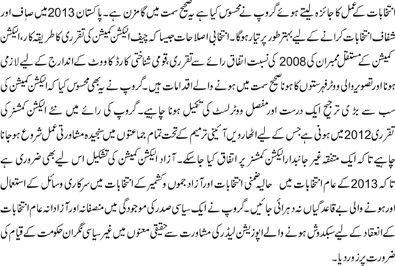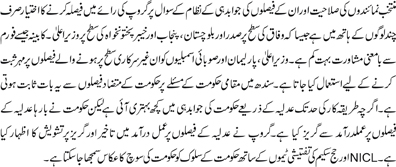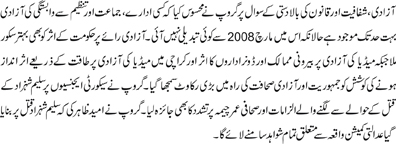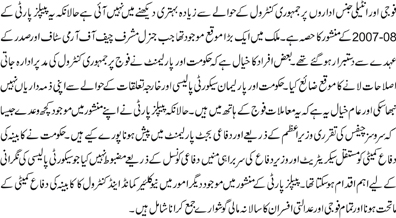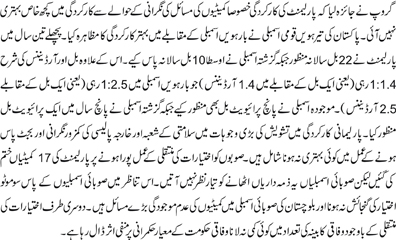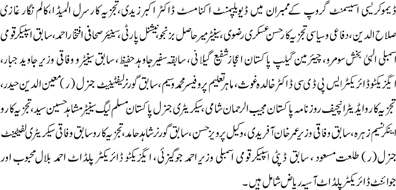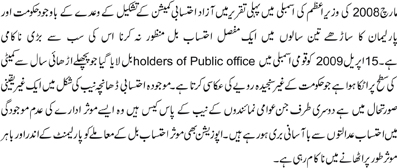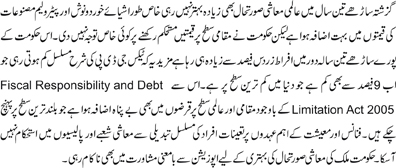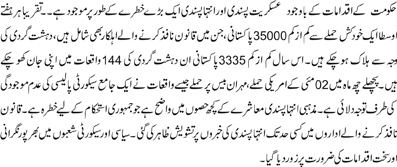Islamabad, September 15, 2011; The Democracy Assessment Group (DAG), convened by PILDAT, has cautioned that poor governance and economic disarray in the country are weakening the consensus on democracy. To prevent the erosion of this important consensus, citizens themselves bear a heavy responsibility to engage with and strengthen the democratic system. Citizens need to increase their political activism and constructive engagement with the political process.
Assessing the Quality of Democracy in Pakistan on the International Day of Democracy and on the completion of 3 ½ years of this Government and Parliament, the Group believed that whereas the status of Constitutional and institutional arrangements of Democracy is comparatively better than in most parts of our history, the state of governance, rule of law, accountability and integrity in public office have reached alarming lows. The Group saw little evidence of a political will required to arrest this slide.
Despite the promise of an independent accountability commission in Prime Minister’s first speech in March 2008, the inability of the Government and the Parliament to pass a comprehensive accountability law in 3 ½ years is its greatest failure. The Holders of Public Offices (Accountability) Bill 2009, which was introduced in the National Assembly on April 15, 2009, remains stuck at the Committee stage for the last 2 ½ years. This reflects the lack of focus on instituting an independent accountability commission. The existing accountability mechanism in the form of the NAB is in limbo and it appears to suit the high profile accused persons, including the intended beneficiaries of the NRO, to breeze through the Accountability Courts. This failure is shared by Opposition parties for their inability to address the issue of delay in passing of an effective Accountability bill.
While the global economic environment over the last 3 ½ years has not been very favourable, particularly with regard to high commodity prices, especially food and petroleum, the incumbent Government has not done enough to keep domestic prices low. For almost the entire 3 ½ years of the tenure of this Government, inflation has been in double-digits. Furthermore, the tax-to-GDP ratio has continued to fall and is now below 9%, one of the lowest in the World. This has also led to an increase in domestic and international debt, which is at its highest ever disregarding the requirements of the Fiscal Responsibility and Debt Limitation Act, 2005. Frequent changes in key personnel in the area of finance and economy have undermined stability and confidence in the financial and economic sector. The Government has failed to create a positive consultative framework to involve the opposition in addressing systemic issues of the economy.
The Group noted with satisfaction some of the major accomplishments of the democratic order in 3 ½ years which include restoration of Judiciary and its continuing assertiveness; unanimous passage of the 18th and 19th Constitutional Amendments; 7th National Finance Commission (NFC) Award; an effective Public Accounts Committee in the centre, an inclusive role of the opposition in the Parliament and the Provincial Assemblies, Aghaz-e-Huqooq-e-Balochistan package, the Gilgit-Baltistan Empowerment and Self-Governance Order, 2009, and reforms in FATA, etc. It was noted with concern that no Provincial Government has installed elected local government system, a crucial third tier of democracy.
However, the Group felt that in key challenges facing Pakistan such as containing and reversing insurgency in Balochistan and ensuring law and order in Karachi, the incumbent Government has done little that shows any positive progress. From President Zardari’s apology to Baloch people for years of injustices, a consensus National Finance Commission (NFC) award, 18th Constitutional Amendment, Aghaz-e Haqooq e Balochistan package and announcing a high level Judicial Commission to probe the murder of Sardar Akbar Khan Bugti, there is little buy-in from the Baloch leaders and people and apparently the Federal Government and the Provincial Government in Balochistan have not been able to capitalize on the momentum generated by the above substantial actions to restore peace in Balochistan. The insurgency continues and Baloch leaders loudly claim civil government, both in the centre and in the province, is not in-charge and has abdicated constitutional responsibility to the security agencies.
Since the very start of this Government’s tenure Karachi has witnessed intermittent violence which has political, ethnic and economic context. The past three years have seen a great escalation in this violence: from 273 people killed in target killings in 45%9 to 778 people in 2010 and over 1400 people are killed in just the first eight months of 2011. While violence continues in Karachi, the major political parties and groups remain busy in perpetuating their own partisan interests.
The Group demanded that high level judicial probe is needed into the shocking revelations made by former Home Minister Sindh Mr. Zulfiqar Mirza on August 28, 2011.
Despite the efforts made by the Government, militancy and extremism continue to be a potent threat.. With an average of more than one suicide bombing every week, at least 35,000 Pakistanis including security personnel, have died since 9/11 in terrorist attacks across Pakistan. This year alone at least 3,335 people have died in 144 terrorist activities till date. The past six months witnessed alarming incidents including the May 02 raid and PNS Mehran attack that have led to questions being raised over the absence of a well-thought-out and coherent national security strategy. Violent religious extremism is already visiable in some parts of society and threatens democratic stability. There are concerns at reports of limited but real radicalization in the security forces. Stringent monitoring and deterrent actions are required by both the political and security spheres.
In assessing quality of democracy in Pakistan, the Group based its analysis on a comprehensive framework. Addressing questions such as how democratic and inclusive is the constitutional framework in the country, the Group felt that after the 18th Constitutional Amendment, Pakistan’s constitutional framework is more inclusive and democratic today than it was in March 2008.
In reviewing electoral process and electoral reforms, the Group scored it as a positive and believed that Pakistan is moving in a direction where it will be in a better position to hold free and fair Election in 2013 than it was in 2008. Electoral reforms such as the procedure to appoint CEC, bi-partisan consensus appointment of permanent members of the Election Commission and mandatory use of CNIC for voter registration and a new voters list with pictures are the reasons for optimism. The Group emphasised that it is critical that the quality and timely completion of an accurate and uptodate voters list be assigned the top-most priority by the Election Commission of Pakistan. The Group also noted that the appointment of the new Chief Election Commissioner is due in March 2012 and advised that bi-partisan consultations should begin in the earnest to identify and appoint a consensus Chief Election Commissioner in line with the provisions of the 18th Constitutional Amendment. An independent Election Commission is needed to ensure that the kinds of election irregularities and misuse of official resources witnessed in certain by-elections and in Azad Kashmir, are not repeated in 2013. The Group also emphasised the need for a truly non-partisan caretaker government to be installed after meaningful consultation with the outgoing Leader of the Opposition to ensure a free and fair election despite the presence of a partisan President.
Commenting on the system of collective decision making by elected representatives and the level to which elected and appointed executive is accountable for its actions, the Group analysed that decision making remains concentrated in the hands of a few individuals or informal bodies such as the President at the centre and Chief Ministers in the case of Punjab, Khyber Pakhtunkhwa and Balochistan with little consultation at the formal institutions such as the cabinets in real sense. Consultation, mostly, appears to be meant to endorse the decisions taken by the President and the Chief Ministers; Parliament and Provincial Assemblies are mostly used to hurriedly rubber stamp the decisions taken at informal forums. Rapid about-turns on the local government system in Sindh illustrate the lack of any meaningful role of the legislatures. Accountability of the Executive has improved through courts as far as the process is concerned but the Executive continues to thwart the orders of the Judiciary. The Group expressed its concern at the increasing trend in the Government to employ various tactics to delay and thwart the orders of the superior courts. The treatment meted out to the investigation teams in the NICL and Haj scams are two prominent examples of how the Federal Government treats the judicial process in the apex court.
In terms of freedom of the Judiciary from the pressure of the Executive, the Group scored it as a resounding positive but felt that the Judiciary should also make up for the continuing delay in hearing landmark cases like the Air Marshal (R) Mohammad Asghar Khan versus General (R) Mirza Aslam Beg. To ensure credibility the Judiciary should hear cases in the chronological order in which they are filed.
Looking at how democratic, inclusive and tolerant to dissent are political parties in Pakistan, the Group believed that political parties are not more democratic or inclusive today than they were in 2008 but some positive signs can be seen in the context of tolerance to dissent as embodied by Senator Raza Rabbani, Mr. Shah Mehmood Qureshi, MNA and now Mr. Zulfiqar Mirza in the Pakistan Peoples Party and Mr. Javed Hashmi, MNA, Saranjam Khan and Mr. Ghaus Ali Shah in the PML-N and Senator Salim Saifullah Khan and his likeminded group in the PML. The Group noted that all these dissents are not negative in nature in the sense of better Quality of Democracy.
Analysing freedom, transparency and rule of law, the Group felt that freedom of Association remains a huge positive though it has witnessed no change since 2008. Freedom of speech from the Government’s influence also received a positive analysis from the Group. However the Group felt that growing footprint of foreign governments and their donor affiliates on the Pakistan media as well as the muzzling of this freedom through coercion in Karachi remain huge areas of concern for democracy and independence of media in Pakistan. The Group also noted the allegations regarding the possible involvement of intelligence and security agencies in the death of journalist Salim Shahzad in May 2011 and similar incidents earlier like the kidnapping and torture of journalist Umer Cheema. The Group hoped that the Judicial Commission appointed to probe the murder of journalist Salim Shahzad will bring out all the facts associated with the tragedy.
Civilian democratic control of security and intelligence sectors, a campaign and manifesto promise of the Pakistan Peoples party in 2007-2008, has seen little progress. While the country witnessed a huge opportunity in the events leading to the exit of Gen. Pervez Musharraf from the office of the COAS and later Presidency, many believe the Government and Parliament lost the opportunity to make institutional improvements in the civil-military equation and continue to abdicate their responsibility to take control of key policies and decisions in the realm of national security and regional and foreign relations, largely believed to be the forte of the military in Pakistan. While the PPP Government has fulfilled, albeit in a token gesture, some of its manifesto promises such as the appointment of three service chiefs to be made by the Prime Minister and details of Defence Budget to be placed before the Parliament, it has not moved to strengthen the Defence Committee of the Cabinet with a permanent secretariat, and to activate the defence council headed by the Defence Minister, both crucial institutional arrangements needed to oversee the country’s security policies in a holistic manner. The PPP manifesto promises, hitherto unfulfilled, also included Nuclear Command and Control to be placed under the Defence Committee of the Cabinet, all Military and Judicial Officers to file annual statements of Wealth and Income, etc.
Performance of the Parliament, especially the effectiveness of its committees in debating national issues and policies and in exercising oversight over the executive has seen little improvement, the Group observed. The 13th National Assembly of Pakistan has performed significantly better compared to the 12th National Assembly of Pakistan in terms of legislation – it passed an average of 22 bills per year compared to average of 10 bills passed by the 12th National Assembly and has seen a marked improvement in its ordinance to bill ratio at 1.4 compared to the 12th National Assembly’s average of 2.5 Ordinances passed for every Bill. The 13th National Assembly has also passed 5 Private Members bills in 3 Parliamentary years compared to the previous Assembly which only passed 1 Private Member Bill during its 5 year tenure. The key areas of concern in Parliament’s performance include weak oversight of foreign policy and security sector and lack of improvement in the Parliamentary budget process. As a result of devolution, 17 National Assembly Committees have been dissolved. However the Provincial Assemblies seem unprepared to take over the responsibility. The absence of any Standing Committees in the Provincial Assembly of Balochistan and the lack of suo moto powers for the Provincial Assembly Committees are major issues also in this regard. Despite devolution of a large number of subjects to the provinces, the federal cabinet size has not shrunk which does not reflect well on the quality of governance at the federal level.
PILDAT’s objective in facilitating the assessment of the Quality of Democracy in Pakistan is to identify and celebrate the strengths and achievements of Democracy as well as to point out the weaknesses so as the citizens and society can work to strengthen democracy through addressing these weaknesses. Drawn from all provinces and regions of Pakistan, the 26-member Democracy Assessment Group or DAG represents the broad diversity of the Pakistani Society. Province, Gender, Profession, Language and Political Affiliation are some of the features of the DAG members’ profiles.
Members of the Democracy Assessment Group include Dr. Akbar Zaidi, Development Economist; Mr. Cyril Almeida, Analyst; Mr. Ghazi Salahuddin, Columnist; Dr. Hasan-Askari Rizvi, Defence and Political Analyst; Senator Mir Hasil Bizenjo, NP, Mr. Iftikhar Ahmad, senior Journalist, Mr. Illahi Bukhsh Soomro, former Speaker National Assembly of Pakistan, Dr. Ijaz Shafi Gilani, Chairman Gallup Pakistan; Mr. Javed Hafeez, former Ambassador; Mr. Javed Jabbar, former Senator and Federal Minister; Dr. Khalida Ghaus, Executive Director SPDC; Prof. Mohammad Waseem, Academician; Lt. Gen. (Retd.) Moinuddin Haider, former Governor; Mr. Mujib-ur-Rehman Shami, Analyst and Editor-in-Chief Daily Pakistan; Senator Mushahid Hussain Sayed, Secretary General, PML; Ms. Nasim Zehra, Analyst and Anchor; Mr. Omar Khan Afridi, former Minister; Dr. Parvez Hassan, Lawyer; Sardar Khalid Ibrahim, Advocate; Mr. Sartaj Aziz, former Senator and Federal Minister; Mr. Shahid Hamid, former Governor; Ms. Sherry Rehman, MNA, PPPP & former Federal Minister; Lt. Gen. (Retd.) Talat Masood, Analyst and former Federal Secretary; Mr. Wazir Ahmed Jogezai, former Deputy Speaker National Assembly of Pakistan, Mr. Ahmed Bilal Mehboob, Executive Director PILDAT and Ms. Aasiya Riaz, Joint Director PILDAT.


